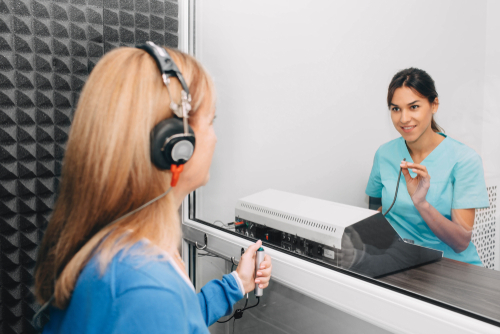The average person does not know how to recognize the first signs of hearing impairment. They are usually unaware as to who to turn to in order to deal with their newfound hearing problem. Many suffer in silence or attempt to have their problem solved by a healthcare professional who does not specialize in hearing loss and related disorders.
Furthermore, hearing loss can be caused by a myriad of different factors, including certain medications, natural aging, blunt force trauma to the eardrum or inner ear, exposure to loud noises, certain illnesses, an ear infection or even an ear disease. It is highly recommended to consult with a qualified audiologist in order to receive an accurate diagnosis.
Who are Audiologists?
An audiologist is a clinically trained and licensed specialist who helps treat, diagnose, and evaluate central auditory processing issues, helping those who suffer from some degree of hearing loss. If you are currently suffering from a noticeable or marked hearing disorder or some degree of hearing loss, then your doctor will likely refer you to an audiologist.
During the evaluation, the audiologist will perform a hearing test to ascertain the degree of hearing loss that you are currently experiencing. The audiologist will provide a course of treatment to help alleviate your symptoms. Also, while it is true that hearing loss can be permanent, an audiologist will help prescribe the ideal treatment modality for you, which may include hearing rehabilitation, a listening unit or apparatus, or a state of the art hearing aid solution.
What Does an Audiologist Do?
An audiologist’s first duty is to try and prevent hearing loss from occurring in the first place. To do so, they may create and coordinate programs that will be used at offices and schools to help create awareness of hearing loss and what steps can be taken to prevent it from happening. They are also known to travel to specific venues or construction sites in order to measure the acoustic environment. By doing so, they can provide suggestions that can help reduce noise pollution in the area.
Furthermore, an audiologist will perform hearing tests on patients with hearing loss in order to determine the root cause of the hearing impairment. For instance, they may perform an auditory functionality test, a nerve assessment test, or some other diagnostic test to identify the cause of the hearing loss.
Once the root cause has been identified, the audiologist will prescribe a hearing treatment program. This may include a hearing aid that is monitored routinely and fitted perfectly according to the unique contours of your ears. You will be required to attend followed-ups frequently in order to track your hearing progress. During these follow-ups, they may also modify your rehabilitation program if any changes are detected.
Role of An Audiologist in Getting the Correct Hearing Care
An audiologist will work with you to evaluate everything related to your hearing and your ear health as well. To do so, they will take measurements and gather information about your medical and family history. From this, they can provide honest and productive counsel, and also offer a rehabilitative treatment modality or plan for your unique hearing condition.
As a multitude of factors can cause hearing loss, the audiologist’s role is to help identify the root cause of your hearing loss. The audiologist prescribes a customized treatment plan that has the highest probability of helping curb your hearing loss.
The audiologists come from a multitude of disciples, including counseling, physiology, anatomy, physics, rehabilitation, perceptions and acoustics of the auditory system. They can take a multidisciplinary or multi-variable approach to help prescribe the best treatment for you.
Source: Hearing Solutions
Other Responsibilities
Audiologists are expected to keep abreast of the latest advancements in the hearing loss field in order to provide their patients with the most advanced treatments in the discipline. They are expected to continue their training by attending seminars and workshops in order to expand their knowledge of hearing loss and its various treatments.
Some may even perform independent research that pertains to hearing loss, on a clinical level, to help create new treatment modalities for hearing loss. While audiologists will assist in training their patients with managing their hearing loss, they are also expected to train other medical providers, as well as supervise patient care staff and caregivers.

